STDF Cameroon: 5th Steering Committee meeting
- 10/02/2022
- Posted by: Sandra Borma
- Category: Cameroon, News
No Comments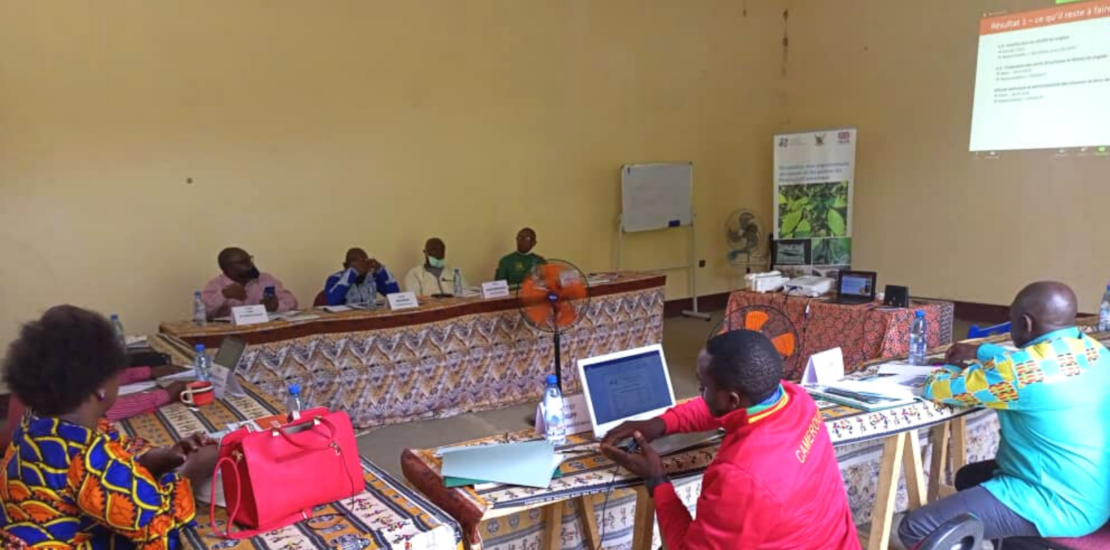 On 3 February, the 5th meeting of the Steering Committee (COPIL) of the project “Improvement of the sanitary and phytosanitary quality of Penja pepper in Cameroon to facilitate access to international markets” (STDF/PG/593) was held to discuss the project’sfinal year. This year’s programme, validated at the COPIL meeting, focuses on training for the various trades involved in Penja pepper; awareness-raising on good storage and transport practices for distributors; the purchase of equipment; and the creation of awareness-raising information on SPS… +
On 3 February, the 5th meeting of the Steering Committee (COPIL) of the project “Improvement of the sanitary and phytosanitary quality of Penja pepper in Cameroon to facilitate access to international markets” (STDF/PG/593) was held to discuss the project’sfinal year. This year’s programme, validated at the COPIL meeting, focuses on training for the various trades involved in Penja pepper; awareness-raising on good storage and transport practices for distributors; the purchase of equipment; and the creation of awareness-raising information on SPS… +News digest: agri-food systems and sustainability
- 10/02/2022
- Posted by: Gaetan Dermien
- Category: Africa, Angola, Benin, Burkina Faso, Burundi, Cameroon, Caribbean, Côte d'Ivoire, Democratic Republic Of The Congo, Dominican Republic, Ethiopia, Fiji, Ghana, Guinea, Kenya, Madagascar, Mali, Mauritius, News, Nigeria, Pacific, Rwanda, Senegal, Sierra Leone, Suriname, Tanzania, Togo, Uganda, Zimbabwe
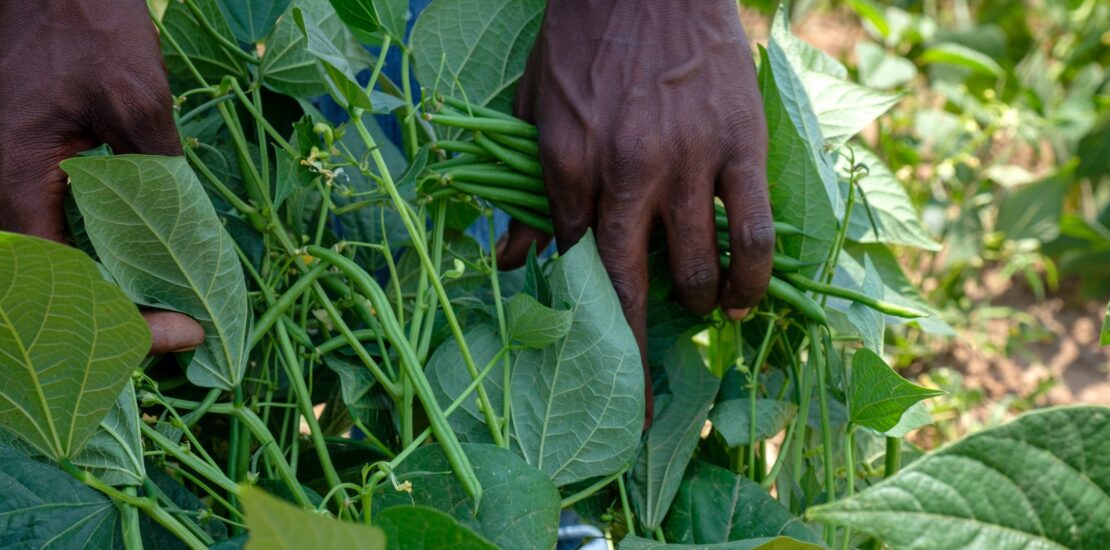 FOOD SYSTEMS AND POLICY Trade relations between the European Union and Africa: forging new partnerships On 10 January, in the context of the French Presidency of the Council of the European Union and ahead of the European Union-African Union Summit scheduled for February 2022, Franck Riester, French Minister Delegate for Foreign Trade and Economic Attractiveness, held an international ministerial conference dedicated to the prospects of the European trade partnership with Africa. The overhaul of the partnership between the European Union… +
FOOD SYSTEMS AND POLICY Trade relations between the European Union and Africa: forging new partnerships On 10 January, in the context of the French Presidency of the Council of the European Union and ahead of the European Union-African Union Summit scheduled for February 2022, Franck Riester, French Minister Delegate for Foreign Trade and Economic Attractiveness, held an international ministerial conference dedicated to the prospects of the European trade partnership with Africa. The overhaul of the partnership between the European Union… +Message to our members and partners
- 09/02/2022
- Posted by: Gaetan Dermien
- Category: Angola, Benin, Burkina Faso, Burundi, Cameroon, Caribbean, Côte d'Ivoire, Democratic Republic Of The Congo, Dominican Republic, Ethiopia, Fiji, Gambia, Ghana, Guinea, Kenya, Madagascar, Mali, Mauritius, News, Nigeria, Pacific, Rwanda, Senegal, Sierra Leone, Suriname, Tanzania, Togo, Uganda, Zimbabwe
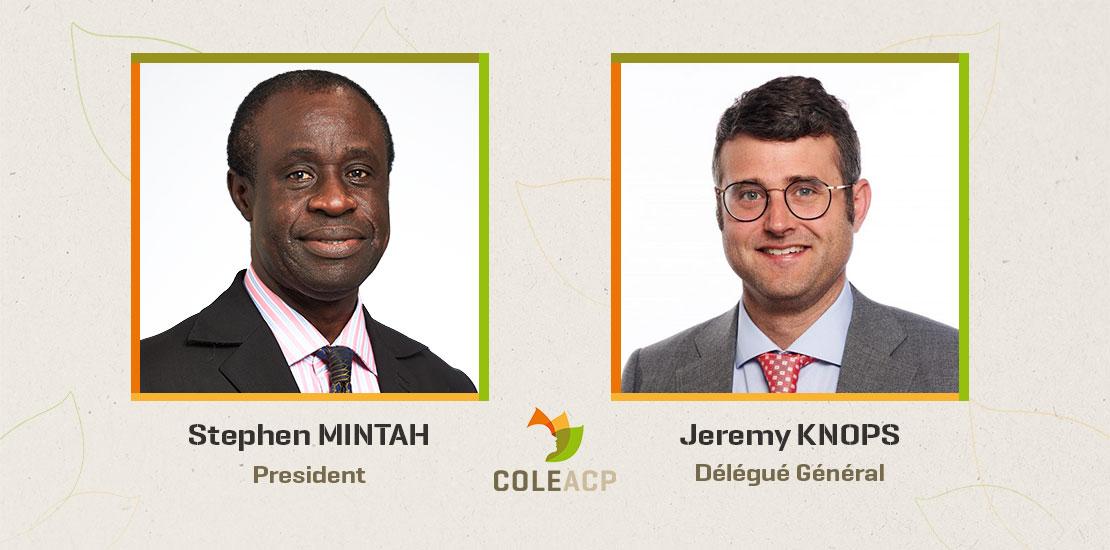 Dear friends of COLEACP, On behalf of COLEACP and the team, we are pleased to send you our best wishes for 2022, and especially we wish you and your loved ones very good health. We are approaching this new year with cautious optimism, while launching an appeal to the whole COLEACP family to continue to mobilise our individual and collective efforts, which contribute to building a fairer and more sustainable agri-food system. In an international context that – due to… +
Dear friends of COLEACP, On behalf of COLEACP and the team, we are pleased to send you our best wishes for 2022, and especially we wish you and your loved ones very good health. We are approaching this new year with cautious optimism, while launching an appeal to the whole COLEACP family to continue to mobilise our individual and collective efforts, which contribute to building a fairer and more sustainable agri-food system. In an international context that – due to… +“Best development partner” at 2021 Avocado Industry Excellence Awards
- 02/02/2022
- Posted by: Gaetan Dermien
- Category: Avocados, Kenya, News
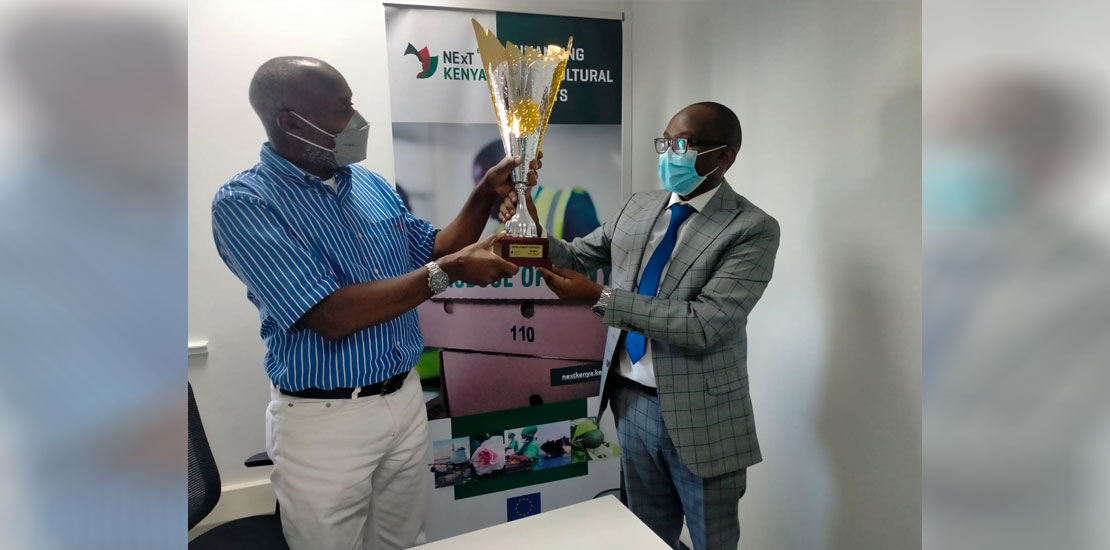 Dr Chagema Kedera, NExT Kenya Programme Coordinator, received the trophy from Avocado Society of Kenya CEO Mr Ernest Muthomi. COLEACP’s programme activities in Kenya recently resulted in the award for “best development partner” at the 2021 Kenya Avocado Industry Excellence Awards (KAEA) held on 10 December at the Safari Park Hotel, Nairobi. The KAEA, now in its second edition and becoming a national ritual, is an initiative of the Avocado Society of Kenya. The awards acknowledge and recognise contributions to… +
Dr Chagema Kedera, NExT Kenya Programme Coordinator, received the trophy from Avocado Society of Kenya CEO Mr Ernest Muthomi. COLEACP’s programme activities in Kenya recently resulted in the award for “best development partner” at the 2021 Kenya Avocado Industry Excellence Awards (KAEA) held on 10 December at the Safari Park Hotel, Nairobi. The KAEA, now in its second edition and becoming a national ritual, is an initiative of the Avocado Society of Kenya. The awards acknowledge and recognise contributions to… +Amendment to the EU plant health legislation – applicable from 11th April 2022
- 31/01/2022
- Posted by: Gaetan Dermien
- Category: Africa, Benin, Burkina Faso, Burundi, Cameroon, Caribbean, Côte d'Ivoire, Country, Democratic Republic Of The Congo, Ethiopia, Ghana, Guinea, Guinea-Bissau, Haiti, Headline, Kenya, Madagascar, Mali, Mauritius, News, Nigeria, Pacific, Republic of the Congo, Rwanda, Senegal, Sierra Leone, Tanzania, Togo, Uganda, Zimbabwe
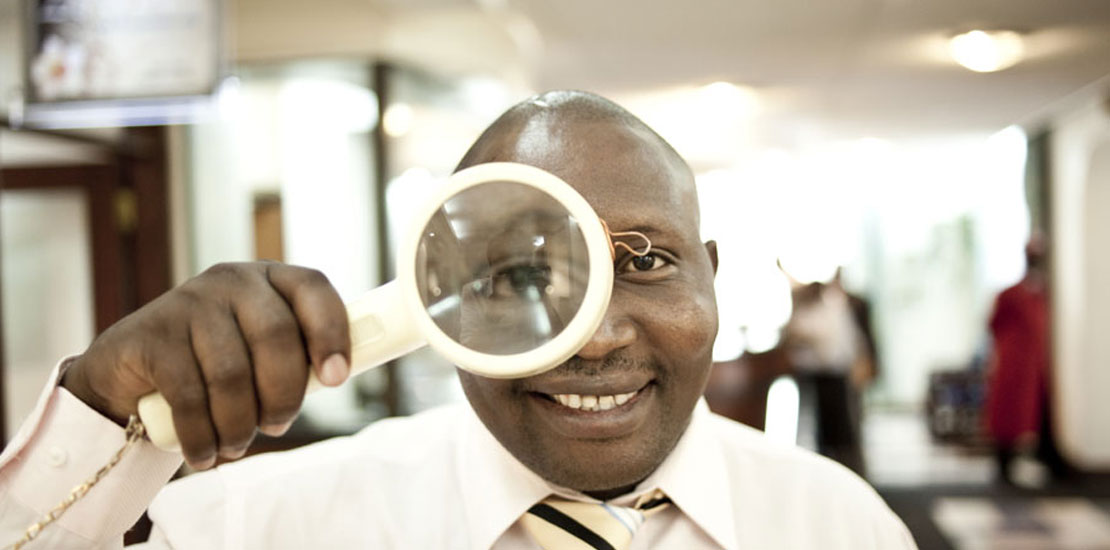 In August 2021, COLEACP issued a Flash Info advising of a public consultation by the European Commission on proposed amendments to the EU plant health legislation. The resulting amendments have now been incorporated into the new Commission Implementing Regulation (EU) 2021/2285, published on 14th December 2021. These amendments concern the listing of pests, prohibitions and requirements for the introduction into, and movement within the European Union of plants, plant products and other objects (amending Regulation (EU) 2019/2072). They will apply… +
In August 2021, COLEACP issued a Flash Info advising of a public consultation by the European Commission on proposed amendments to the EU plant health legislation. The resulting amendments have now been incorporated into the new Commission Implementing Regulation (EU) 2021/2285, published on 14th December 2021. These amendments concern the listing of pests, prohibitions and requirements for the introduction into, and movement within the European Union of plants, plant products and other objects (amending Regulation (EU) 2019/2072). They will apply… +Workshop to launch the Regional Guide to Good Mango Practices in West Africa
- 21/01/2022
- Posted by: Sandra Borma
- Category: Gambia, Ghana, News
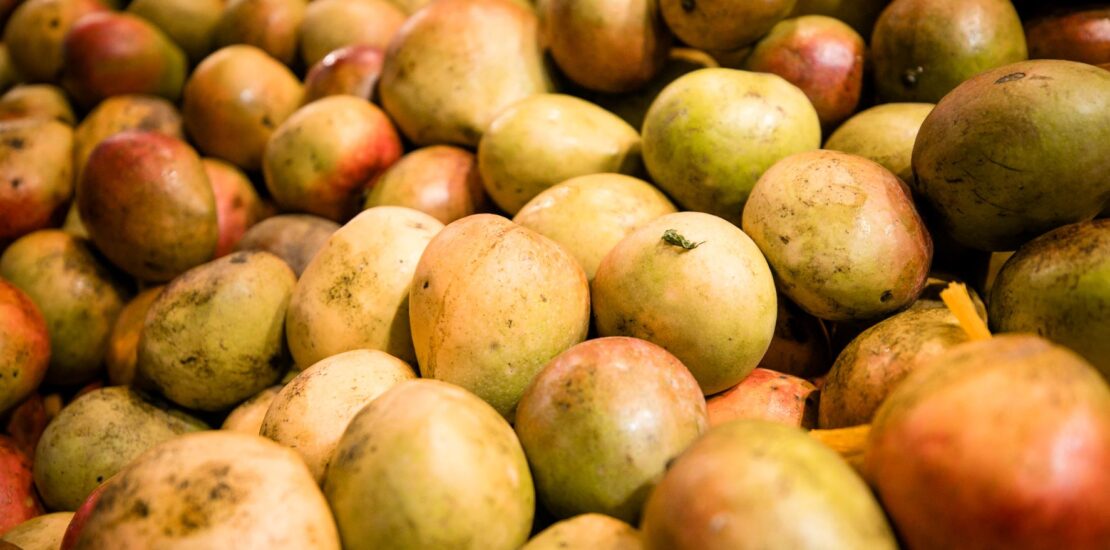 12 January saw the launch of a project to support the development of a “Regional Guide to Good Practices for Mango in West Africa”. The development of the Guide is being organised as part of COLEACP’s partnership with the ECOWAS SyRIMAO project, “Innovative Regional Fruit Fly Management System Project in West Africa”, via the EU-funded Fit For Market SPS programme. The January workshop brought together more than 60 participants, stakeholders in the mango sector from the public sector (competent authorities)… +
12 January saw the launch of a project to support the development of a “Regional Guide to Good Practices for Mango in West Africa”. The development of the Guide is being organised as part of COLEACP’s partnership with the ECOWAS SyRIMAO project, “Innovative Regional Fruit Fly Management System Project in West Africa”, via the EU-funded Fit For Market SPS programme. The January workshop brought together more than 60 participants, stakeholders in the mango sector from the public sector (competent authorities)… +Cameroon: Working week for the implementation of COLEACP R-SAT tool
- 20/01/2022
- Posted by: Sandra Borma
- Category: Cameroon, News
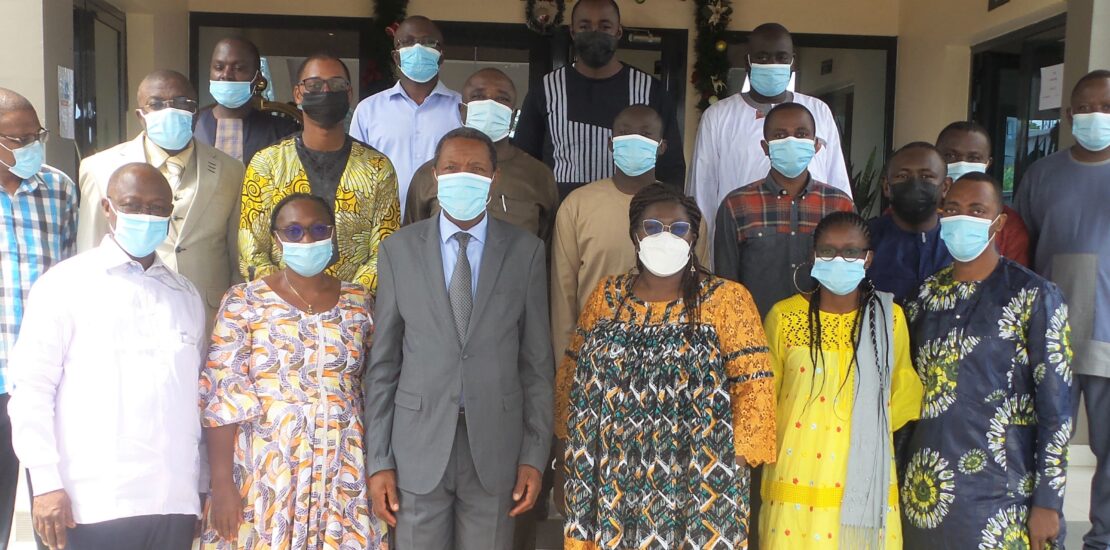 A week-long workshop was held in early January in Kribi, bringing together the private and public sectors involved in the mango value chain (fresh and dried), to discuss the implementation of COLEACP’s Rapid SPS Assessment Tool (R-SAT). The tool and its roll-out are supported by the Fit For Market SPS programme, continuing COLEACP’s activities in support of Cameroon’s horticultural sector and Department of Regulation and Quality Control of Agricultural Products and Inputs (DRCQ). R-SAT supports Competent Authorities to assess the… +
A week-long workshop was held in early January in Kribi, bringing together the private and public sectors involved in the mango value chain (fresh and dried), to discuss the implementation of COLEACP’s Rapid SPS Assessment Tool (R-SAT). The tool and its roll-out are supported by the Fit For Market SPS programme, continuing COLEACP’s activities in support of Cameroon’s horticultural sector and Department of Regulation and Quality Control of Agricultural Products and Inputs (DRCQ). R-SAT supports Competent Authorities to assess the… +Update on EU MRL changes
- 19/01/2022
- Posted by: Gaetan Dermien
- Category: Afghanistan, Albania, Algeria, Andorra, Angola, Anguilla, Antigua and Barbuda, Argentina, Armenia, Aruba, Australia, Austria, Azerbaijan, Bahamas, Bangladesh, Barbados, Belarus, Belgium, Belize, Benin, Bermuda, Bhutan, Bolivia, Bosnia and Herzegovina, Botswana, Brazil, Bulgaria, Burkina Faso, Burundi, Cambodia, Cameroon, Canada, Cape Verde, Central African Republic, Chad, Chile, China, Colombia, Comoros, Cook Islands, Costa Rica, Côte d'Ivoire, Croatia, Cuba, Cyprus, Czech Republic, Democratic Republic Of The Congo, Denmark, Djibouti, Dominica, Dominican Republic, Ecuador, Egypt, El Salvador, Equatorial Guinea, Eritrea, Estonia, Eswatini, Ethiopia, Faroe Islands, Federated States of Micronesia, Fiji, Finland, France, French Guiana, French Polynesia, Gabon, Gambia, Georgia, Germany, Ghana, Greece, Greenland, Grenada, Guadeloupe, Guam, Guatemala, Guinea, Guinea-Bissau, Guyana, Haiti, Headline, Honduras, Hong Kong, Hungary, Iceland, India, Indonesia, Iran, Iraq, Ireland, Israel, Italy, Jamaica, Japan, Jordan, Kazakhstan, Kenya, Kiribati, Kuwait, Kyrgyzstan, Latvia, Lebanon, Lesotho, Liberia, Liechtenstein, Lithuania, Luxembourg, Macao, Madagascar, Malawi, Malaysia, Maldives, Mali, Malta, Marshall Islands, Martinique, Mauritania, Mauritius, Mayotte, Mexico, Monaco, Mongolia, Montserrat, Morocco, Mozambique, Myanmar, Namibia, Nauru, Nepal, Netherlands, New Caledonia, New Zealand, News, Nicaragua, Niger, Nigeria, Niue, Northern Mariana Islands, Norway, Oman, Pakistan, Palau, Panama, Papua New Guinea, Paraguay, Peru, Philippines, Poland, Portugal, Puerto Rico, Qatar, Republic of Korea, Republic of the Congo, Réunion, Romania, Russian Federation, Rwanda, Saint Helena, Saint Kitts and Nevis, Saint Lucia, Saint Vincent and the Grenadines, Samoa, San Marino, Sao Tome and Principe, Saudi Arabia, Senegal, Serbia and Montenegro, Seychelles, Sierra Leone, Singapore, Slovakia, Slovenia, Solomon Islands, Somalia, South Africa, Spain, Sri Lanka, Sudan, Suriname, Sweden, Switzerland, Syria, Taiwan, Tajikistan, Tanzania, Thailand, Timor-Leste, Togo, Tokelau, Tonga, Trinidad and Tobago, Tunisia, Turkey, Turkmenistan, Tuvalu, Uganda, Ukraine, United Arab Emirates, United Kingdom, United States, Uruguay, Uzbekistan, Vanuatu, Venezuela, Vietnam, Yemen, Zambia, Zimbabwe
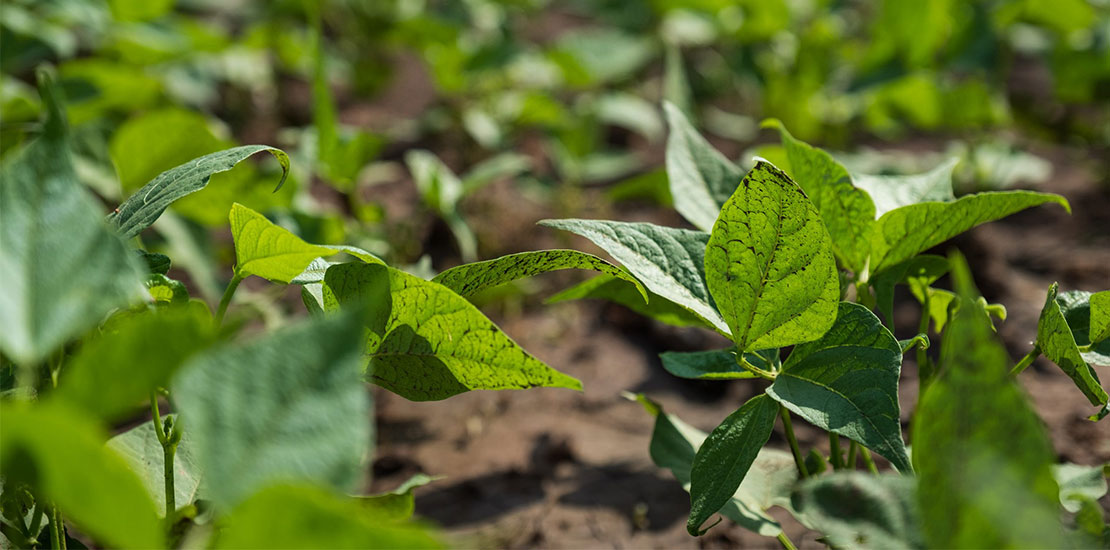 Key points Since our latest news in December 2021, we are highlighting some significant changes affecting five active substances (acequinocyl, Bacillus subtilis strain IAB/BS03, emamectin, flutolanil, and imazamox) used in crop protection (Reg. (EU) 2021/2202). In particular, emamectin is important and widely used in ACP horticulture. The latest changes involve an increase in MRLs for peaches and kiwi fruits. The new Maximum Residue Limit (MRL) for peaches is 0.15 mg/kg (previously 0.03 mg/kg) and for kiwis the new MRL is… +
Key points Since our latest news in December 2021, we are highlighting some significant changes affecting five active substances (acequinocyl, Bacillus subtilis strain IAB/BS03, emamectin, flutolanil, and imazamox) used in crop protection (Reg. (EU) 2021/2202). In particular, emamectin is important and widely used in ACP horticulture. The latest changes involve an increase in MRLs for peaches and kiwi fruits. The new Maximum Residue Limit (MRL) for peaches is 0.15 mg/kg (previously 0.03 mg/kg) and for kiwis the new MRL is… +Senegal: Training on market requirements in Casamance
- 03/01/2022
- Posted by: Sandra Borma
- Category: News, Senegal
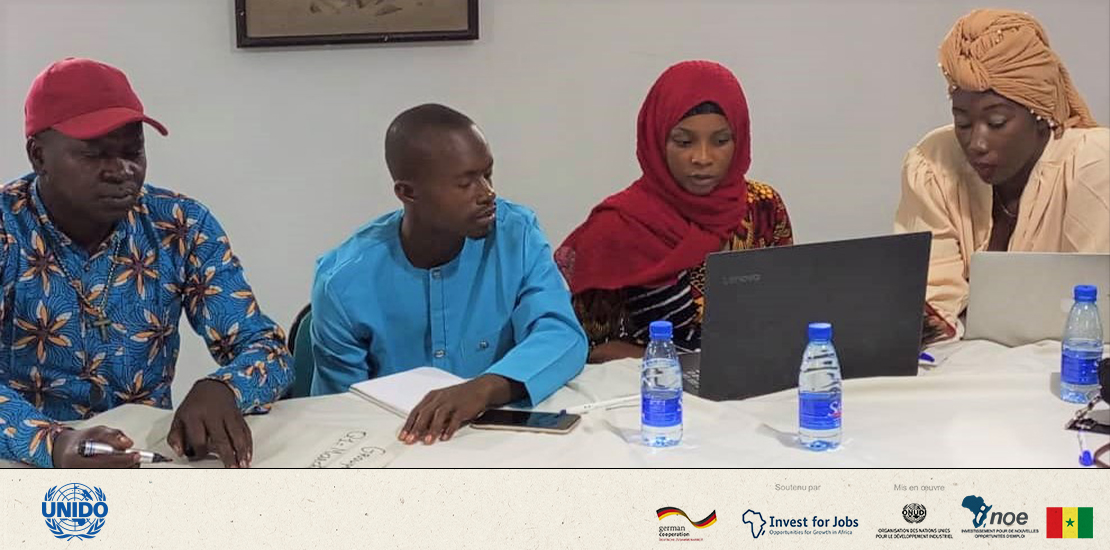 In November–December 2021, COLEACP was capacity building with mango production/processing companies in Casamance, focusing on market requirements. The training, part of COLEACP’s contribution to the UNIDO project “Inclusive and sustainable industrial development for job creation in Senegal and Ethiopia”, aimed to identify the opportunities and obstacles for local, regional and international markets, and the costs of accessing them. The training will enable support structures and companies to better understand the: economic models of local, regional and export markets, their differences,… +
In November–December 2021, COLEACP was capacity building with mango production/processing companies in Casamance, focusing on market requirements. The training, part of COLEACP’s contribution to the UNIDO project “Inclusive and sustainable industrial development for job creation in Senegal and Ethiopia”, aimed to identify the opportunities and obstacles for local, regional and international markets, and the costs of accessing them. The training will enable support structures and companies to better understand the: economic models of local, regional and export markets, their differences,… +COLEACP receives distinction for support to Togo’s organic sector
- 27/12/2021
- Posted by: Sandra Borma
- Category: News, Togo
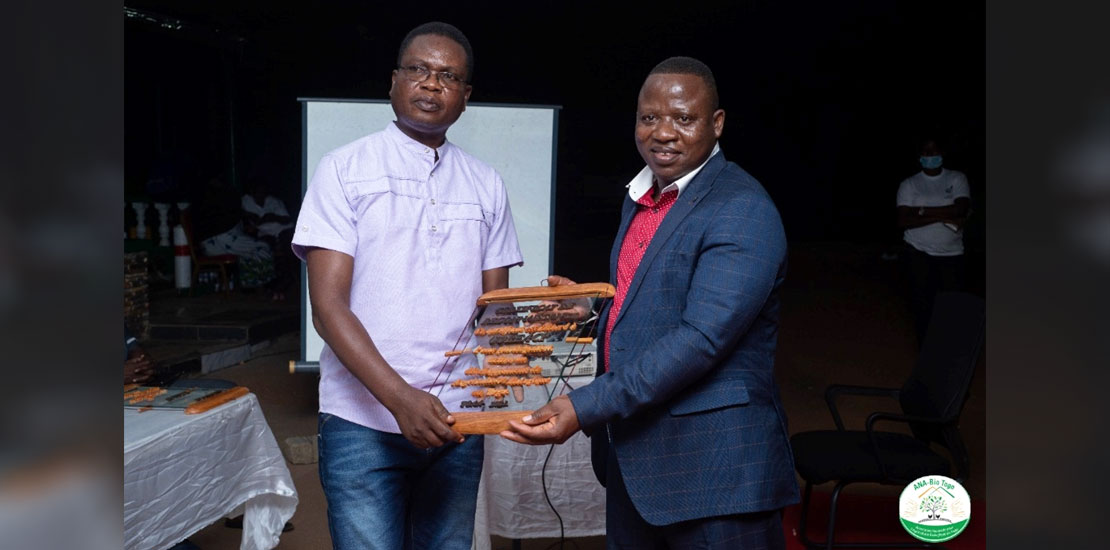 COLEACP, through its Fit For Market SPS programme, was a partner in the second edition of the Organic and Local Organic Fair organised by the Association Nationale pour l’Agriculture Biologique au TOGO (ANA-Bio TOGO) and partners. The aim was to promote the production and consumption of organic products. From 9 to 11 December 2021 in Notsè, Togo, visitors and exhibitors gathered in a friendly atmosphere to experience conferences, presentations and tastings of certified organic products. The event was also the… +
COLEACP, through its Fit For Market SPS programme, was a partner in the second edition of the Organic and Local Organic Fair organised by the Association Nationale pour l’Agriculture Biologique au TOGO (ANA-Bio TOGO) and partners. The aim was to promote the production and consumption of organic products. From 9 to 11 December 2021 in Notsè, Togo, visitors and exhibitors gathered in a friendly atmosphere to experience conferences, presentations and tastings of certified organic products. The event was also the… +
